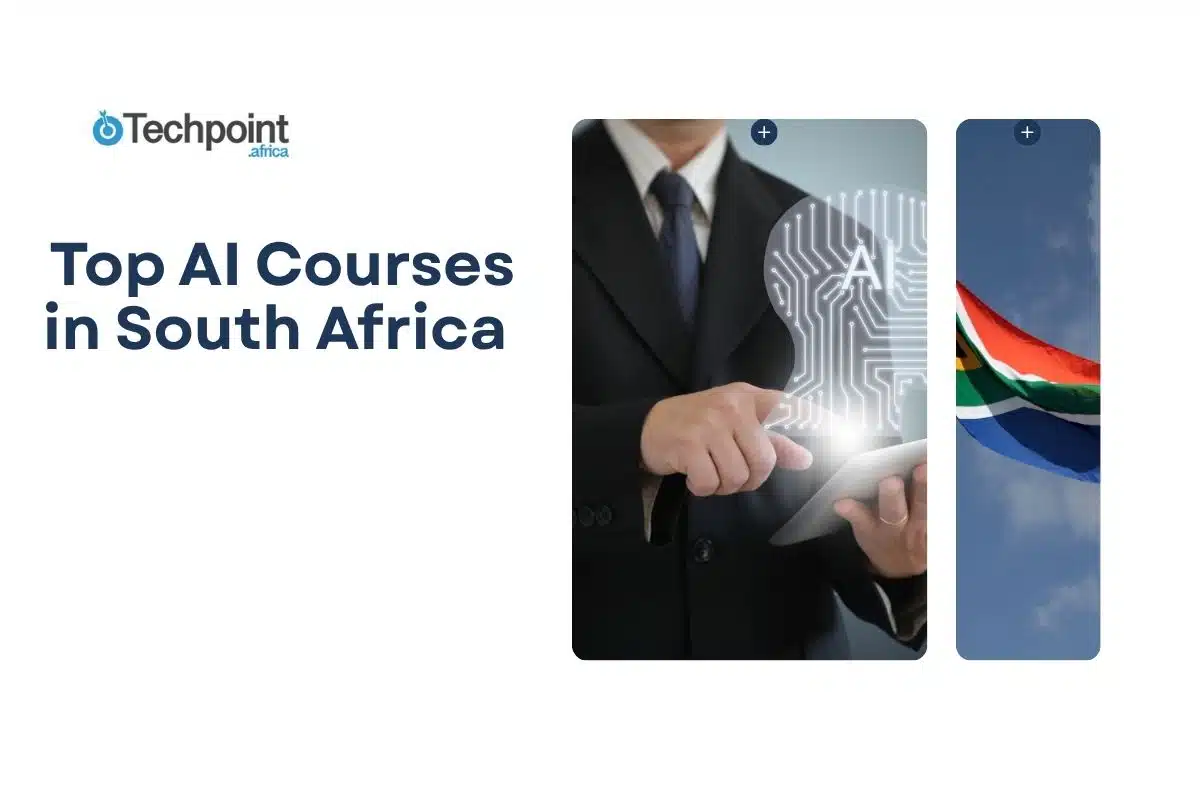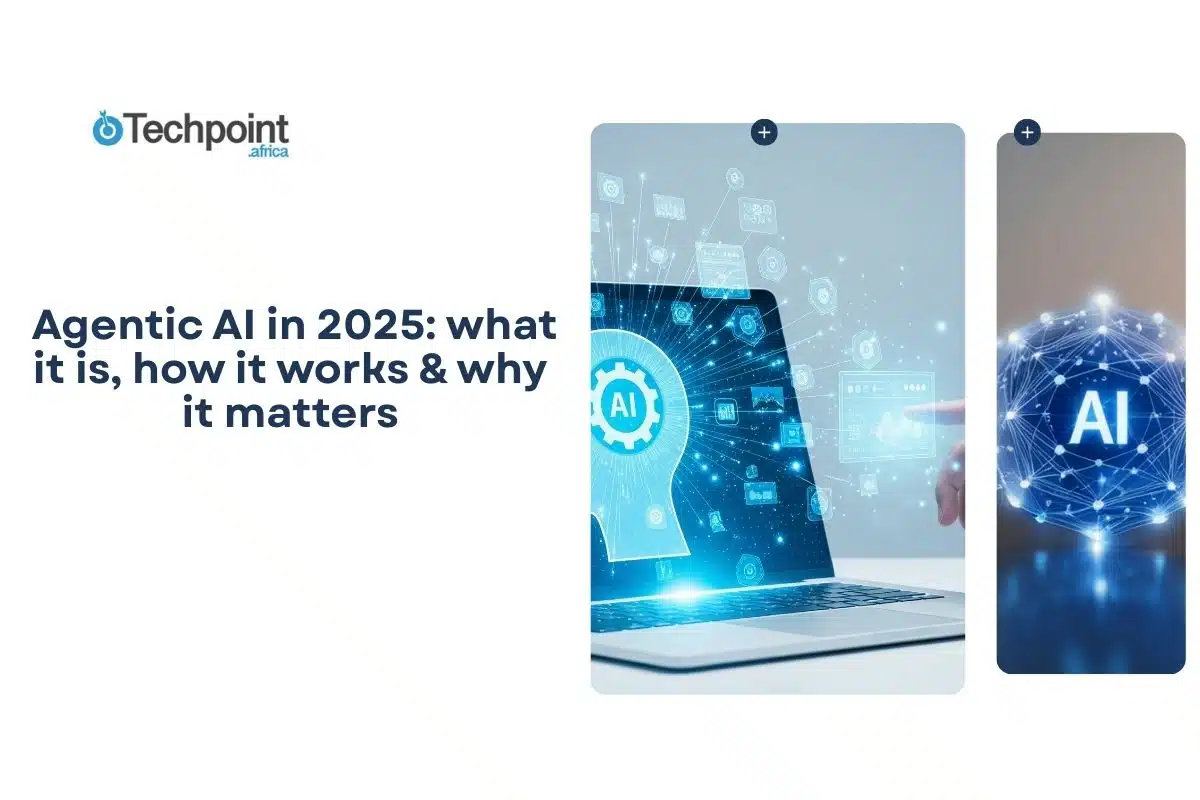If you’ve been trying to figure out which AI course to take in South Africa, you’re not alone. Between university programs, online certificates, and short-term bootcamps, the options keep growing, but it’s not always easy to tell which ones are actually worth it.
This list highlights ten of the most studied AI courses in the country right now. We’ve checked what they cover, how long they run, how much they cost, and the kind of student each one is best suited for.
Whether you’re starting from scratch or trying to sharpen your skills, this gives you a clear view of what’s out there and where each path could lead.
Let’s get started.
1. Stellenbosch University – MSc in Machine Learning and Artificial Intelligence
Duration: ~1 year • Fees: R40 000–R50 000 • High industry placement (~80%)
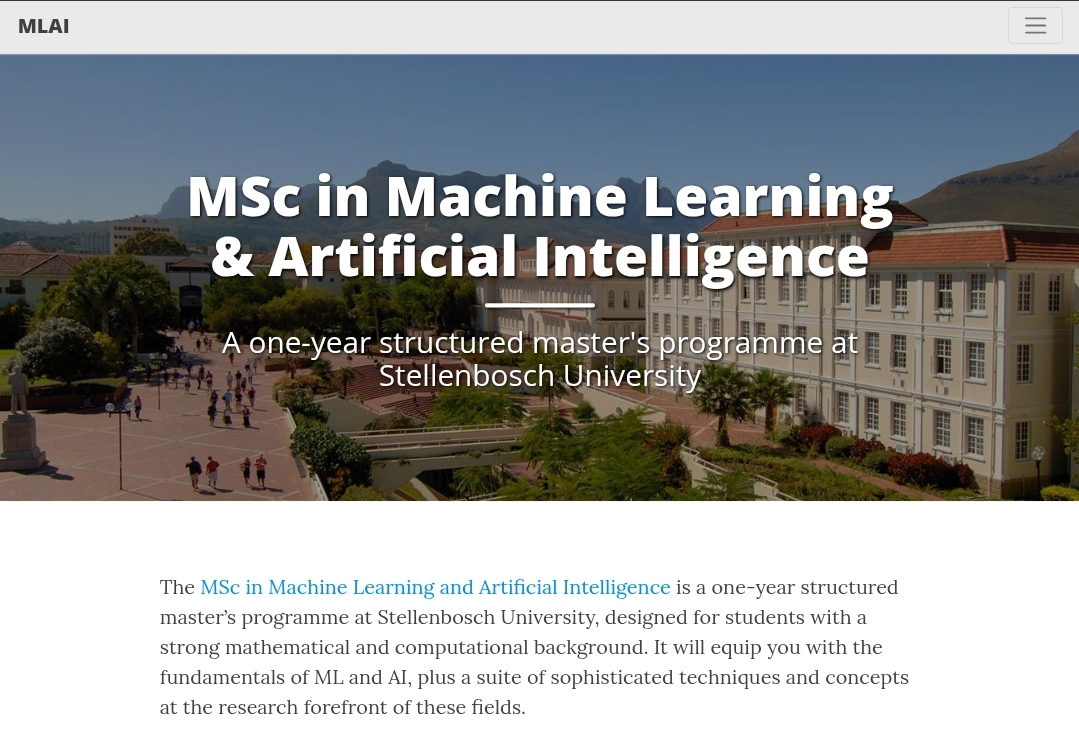
This master’s program at Stellenbosch University is one of the most academically rigorous AI courses in South Africa. It blends theory with real-world relevance, offering students a structured path into machine learning and artificial intelligence through both coursework and a dedicated research project.
The program digs into machine learning theory, applied AI techniques, and data-driven problem-solving. Students also complete an original research project under academic supervision, often aligned with real-world problems in industry or academia.
The full-time option takes one year to complete, while part-time study is also available. It’s designed for students with strong mathematical and technical foundations who are looking to move into advanced roles or pursue further research.
Entry Requirements
To be considered, applicants must have:
- An Honours degree in Applied Mathematics, Computer Science, Mathematical Statistics, or a related discipline
- OR a four-year Engineering degree with a strong quantitative focus
- A solid background in programming, particularly in Python
- A minimum average of around 65% in their final-year modules (though higher is recommended for competitive admission)
Learn more here: https://mlai.sun.ac.za/criteria/
Fees and Scholarships
- Tuition ranges from R40,000 to R50,000 for South African students (updated annually)
- International fees are slightly higher
- DeepMind Africa offers a highly competitive scholarship that covers:
- Full tuition
- Living expenses
- Medical insurance
- Travel costs
- Academic mentorship with DeepMind researchers
- Additional funding opportunities are available through Stellenbosch’s Postgraduate Funding Office
How to Apply
Applications are submitted online via the Stellenbosch University portal. You’ll need to:
- Upload your academic transcripts and degree certificates
- Submit a motivation letter explaining your interest in AI and research goals
- Provide evidence of programming experience (Python preferred)
- Include a current CV
- Check the department’s website for any additional documents or assessments
Deadlines usually fall between August and October, so it’s best to start early.
Learn more here: https://mlai.sun.ac.za/apply/
Who It’s Best For
This program is ideal for students who want to specialise in AI at a high academic level, whether for a future PhD or to work in advanced roles in data science, research, or algorithm development. It’s not a casual course, it’s meant for those ready to engage deeply and build serious expertise.
2. University of the Witwatersrand (wits) – MSc in Artificial Intelligence
Duration: 2 years • Fees: R45 000–R55 000 • Final-year SKA‑linked research
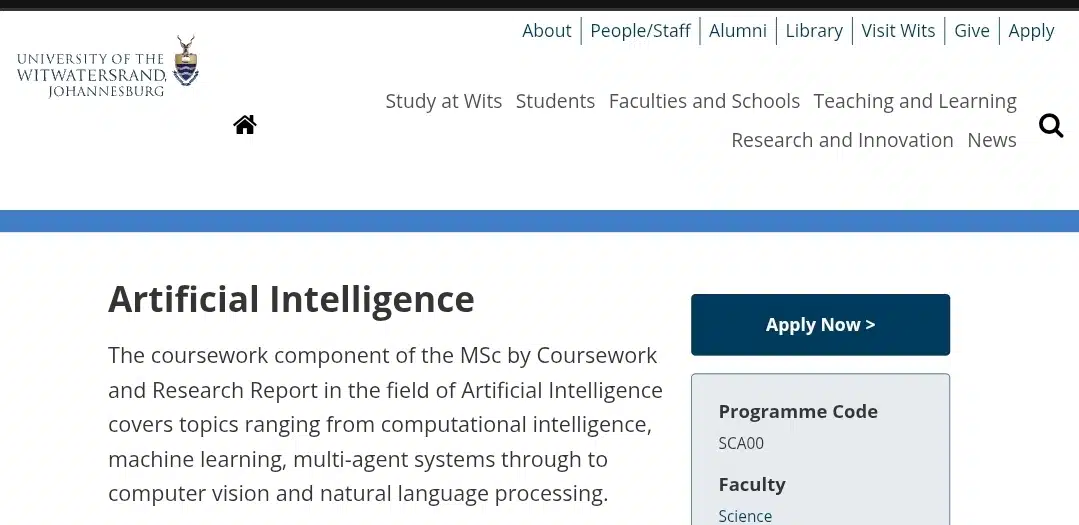
Wits University offers a specialised MSc in Artificial Intelligence designed for students looking to explore AI at an advanced level. The program combines structured coursework with a research component, giving students both theoretical depth and applied experience.
It’s one of the few AI-focused postgraduate degrees in the country with modules spanning machine learning, natural language processing, computer vision, computational intelligence, and multi-agent systems. If you’re planning to work in AI research, applied development or want a solid stepping stone to PhD studies, this course is a strong contender.
The full-time route takes two years: one year for coursework, followed by a year of research and dissertation writing. A part-time option is also available and typically stretches over two to three years.
What You’ll Learn
Students engage with both the foundations and emerging areas of AI, including:
- Neural networks and deep learning
- Natural language processing (NLP)
- Reinforcement learning
- Knowledge representation and reasoning
- Computer vision
- Ethical and social implications of AI
Research plays a key role in the final year, where students complete a dissertation under academic supervision.
Entry Requirements
Applicants must have:
- An Honours degree in Computer Science, Mathematics, Physics, Statistics, or a closely related field
- OR a four-year Engineering degree with a strong background in algorithms, probability, linear algebra, and programming
- A final-year average of at least 65%
- Solid programming skills (Python preferred) and mathematical maturity
Fees and Funding
- Tuition is approximately R44,000 per year (subject to change)
- Wits does not offer guaranteed scholarships for this program
- Students can apply for:
- Postgraduate Merit Award (for previous Wits students)
- National Research Foundation (NRF) bursaries
- Other external funding bodies (applications done separately)
How to Apply
Applications are submitted through the Wits online application portal. You’ll need to provide:
- Academic transcripts and degree certificates (certified copies)
- A detailed CV
- A motivation letter outlining your interest in AI
- Proof of programming experience or technical background
- International students must include SAQA evaluation and proof of English proficiency
The application deadline is usually 31 December for the following year’s intake.
Who It’s Best For
This MSc is suited to students who want strong academic and practical grounding in AI, with the flexibility to explore research. If you’re aiming for a career in AI development, data science, or plan to pursue a PhD, this course offers the depth and structure to prepare you well.
3. University of Cape Town – BSc Computer Science with a focus on AI
3‑year undergrad • Fees: R40 000–R50 000 • Strong AI foundation, 85% employment

UCT’s 3-year Bachelor of Science in Computer Science offers a clear pathway into AI through specialized modules in your third year. As the country’s top-ranked Computer Science degree, it blends strong fundamentals with advanced topics in machine learning and data analysis.
Year 1 and 2 build a foundation in programming, data structures, algorithms, calculus, and statistics. In Year 3, you’ll dive deeper into AI, working on advanced courses and integrating projects into your curriculum.
What You’ll Learn
By the end of your degree, expect to be comfortable with:
- Programming in Python, Java, and other languages
- Core Computer Science concepts: algorithms, data structures, databases, networks
- Advanced modules in AI, machine learning, parallel computing, and bi-weekly project work
- A capstone project that often includes real-world AI applications.
You’ll graduate ready for roles like software developer, data analyst, machine learning engineer or you can progress to honours and beyond with strong academic qualifications.
Entry Requirements
To get in, you’ll need:
- A National Senior Certificate with at least 70% in Mathematics (Level 6) and 60% in English (Level 5)
- An Admission Points Score (APS) around 450 (excluding Life Orientation)
- Good National Benchmark Test (NBT) scores in quantitative and academic literacy tests
- International students must also have appropriate SAQA evaluations
Fees and Funding
- Tuition is roughly R65,000 per year (2025 estimates)
- NSFAS funding is available for qualifying South African students
- Additional scholarships (e.g. University Entrance, Vice-Chancellor’s awards) are awarded based on merit and need
How to Apply
To get started:
- Apply online through the UCT admissions portal
- Submit certified academic transcripts and NSC results
- Include your NBT results when prompted
- International applicants need SAQA verification and proof of English proficiency
- Watch for application deadlines (usually around 30 September each year)
Who It’s Best For
This degree is your best bet if you’re starting out, but aiming high. It balances academic strength with practical skills and offers a strong track record of graduate employment (90% within six months) . If your goal is AI-driven work, be it in software development, data science, or further study, it gives you both a sturdy foundation and flexibility.
4. University of Johannesburg – Master of Artificial Intelligence (Coursework)
Course + research MSc • Includes UJ’s “AI in the 4IR” MOOC
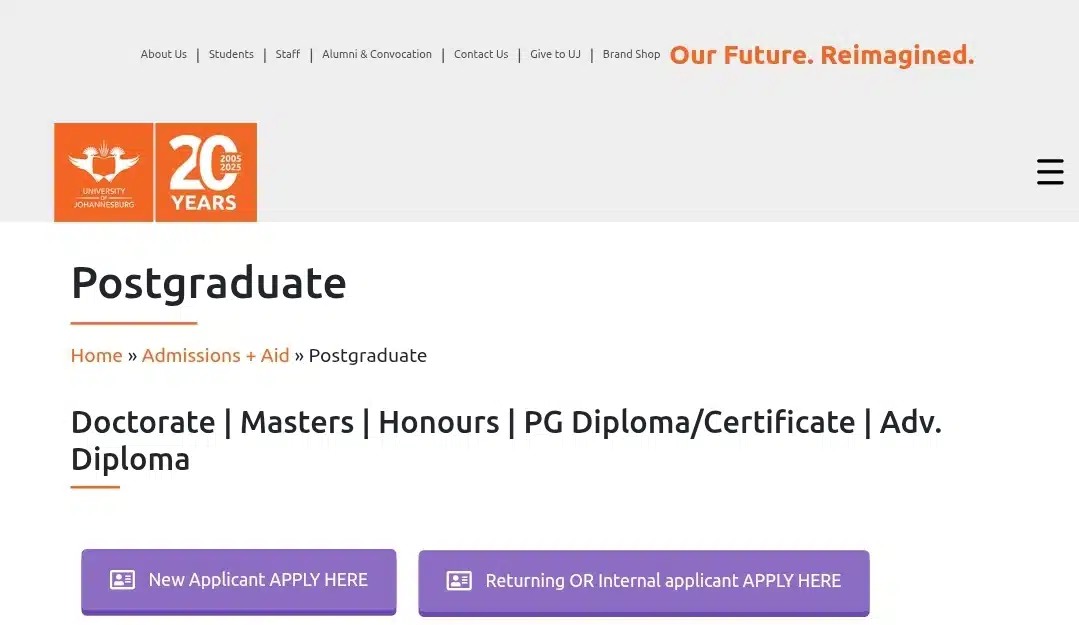
The Master of Artificial Intelligence at UJ, offered through the Institute for Intelligent Systems, is a professional coursework-based program designed for individuals who want to apply AI in real-world settings. With a blend of theory, technical modules, and applied research, the course supports career paths in industry, engineering, commerce, and even academic research.
It’s a structured program made up of eight core modules, covering everything from programming and machine learning to the psychology of AI and ethical considerations. After the coursework phase, students complete a supervised research project aligned with their interests or field.
Duration & Mode
- Full-time: 1 year
- Part-time: 2 years
- Delivered in person at the Auckland Park Kingsway Campus
What You’ll Learn
The curriculum is designed to offer both breadth and depth in the AI space. Students explore:
- Programming for artificial intelligence
- Applied mathematics and statistics
- Ethics and regulation in AI
- Cognitive science and the psychology behind intelligent systems
- Machine learning foundations
- Research methods and an applied AI elective
You’ll round off the degree with a research project that connects your learning to a real-world problem or opportunity.
Entry Requirements
Applicants must have:
- An Honours degree (NQF level 8) in Engineering, Computer Science, Commerce, Economics, or Natural/Mathematical Sciences
- OR a BTech in any of the above, plus at least one year of relevant work or research experience
- Undergraduate-level mathematics, at a minimum of NQF level 5
Fees and Funding
- Fees vary yearly—UJ provides full details on its postgraduate portal
- While there’s no automatic funding, students can apply for internal bursaries or external scholarships
- The multidisciplinary nature of the course also opens doors to funding from industry partners or sector-specific initiatives
How to Apply
Applications open on 1 April each year and close in October. To apply:
- Submit your application via the UJ online portal
- Prepare certified transcripts, your CV, and proof of your mathematics background
- If you’re applying through the BTech route, include documents showing your work or research experience
- After applying online, email your supporting documents and reference number to ujappdocs@listrv.uj.ac.za
Who It’s Best For
This course is well-suited to professionals or graduates who want to deepen their knowledge of AI while keeping one foot in industry. If you’re looking for a practical, multidisciplinary program that equips you to build, manage, or contribute to intelligent systems in the workplace (without going the full academic research route) UJ’s Master of AI strikes that balance.
5. University of Pretoria – BSc (Hons) or MSc Options with Strong AI Modules
Offers undergraduate & postgraduate AI-related tracks
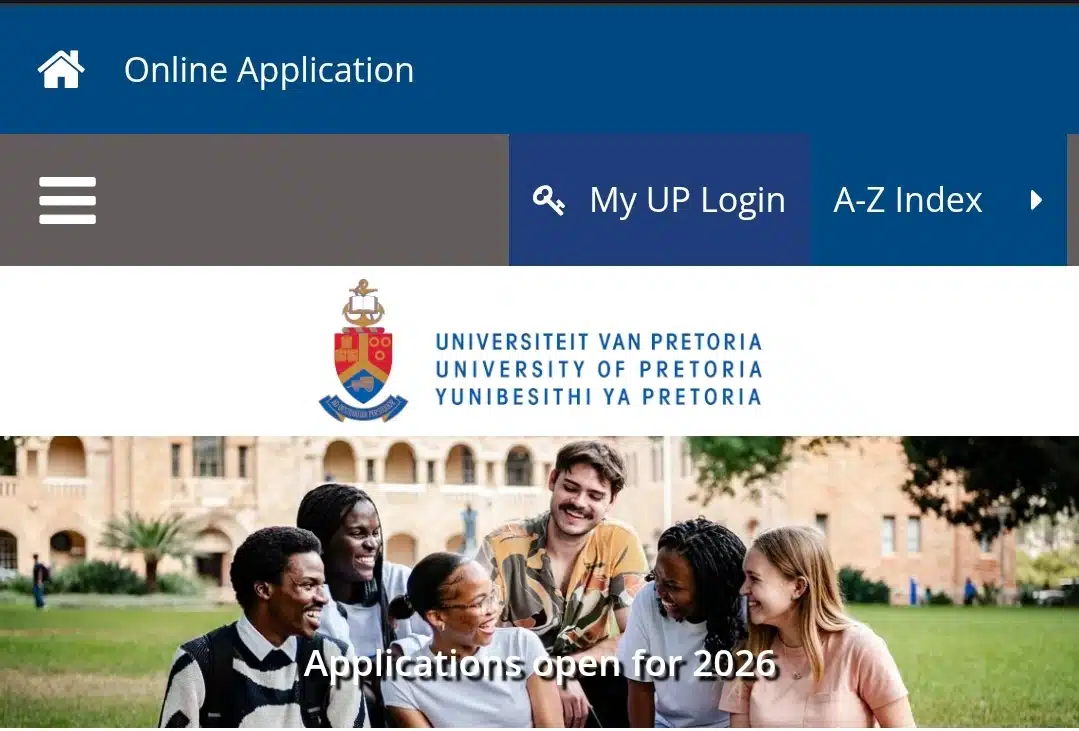
At the University of Pretoria, AI education isn’t a standalone qualification. It’s woven throughout both undergraduate and postgraduate computer science offerings. Students can study AI topics via honours and master’s programs that include computational intelligence, deep learning, and neural networks. This makes the University of Pretoria a solid option if you’re seeking a flexible way to specialise in AI within a broader CS context.
The Honours track allows students to choose between theoretical and applied modules, covering everything from evolutionary computing to neural networks. At the master’s level, your studies can go deeper, building on those foundations with advanced research and technical depth.
What You’ll Learn
- In Honours (NQF 8):
- COS 710 & COS 711—deep dives into evolutionary computation, swarm intelligence, neural networks, immune systems, and fuzzy logic
- COS 790/791—special topics like hyperheuristics and image processing in AI contexts
- In MSc:
- Advanced AI methods
- Potential for original research under academic supervision
Entry Requirements
To qualify for Honours/MSc:
- An undergraduate degree in Computer Science, Engineering, Maths, Stats, or related fields.
- Solid programming skills (Python, Java, etc.) and strong mathematical understanding (calculus, linear algebra).
- Usually a minimum average of 60–65% at Honours level, depending on the program track.
Fees and Funding
- Tuition fees are set annually; expect to pay around R50,000–R60,000 per year for postgraduate studies (ranges may vary)
- Funding isn’t automatically granted, but bursaries like NRF and UP internal awards are available for eligible applicants
How to Apply
- Apply through the University of Pretoria’s online application portal
- Upload certified transcripts and your degree certificate
- Provide a CV and motivation letter stating why you’re choosing the AI track
- International students must include SAQA equivalency and proof of English proficiency
- Deadlines vary—check the department’s postgraduate page for exact dates
Who It’s Best For
If you’re looking for structured yet adaptable AI education within a quality computer science program, UP is worth considering. You’ll benefit from strong academic grounding, flexible specialisation options, and the opportunity to pivot into either research or industry roles without being locked into a single AI stream.
6. African Institute for Mathematical Sciences (AIMS) – African Master’s in Machine Intelligence (AMMI)
10‑month structured MSc • Fully funded with industry mentors (incl. Google AI)
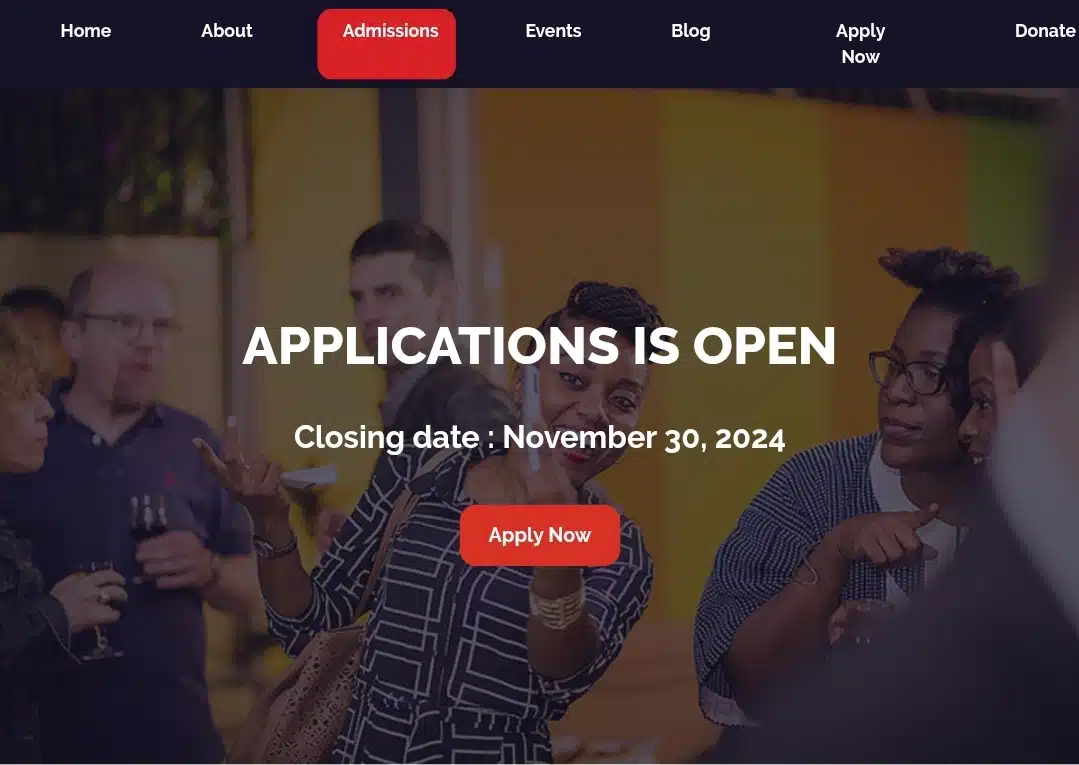
The AMMI programme, part of AIMS’ Pan-African network, launched in 2018 and offers a highly intensive, research-focused Master’s in Machine Intelligence. It spans ten months to one year and is hosted across AIMS centres—including Rwanda and South Africa—depending on the year. The focus is on cutting-edge AI research and real-world applications, especially in areas like cosmology, epidemiology, and ecology.
Google DeepMind and Facebook are founding partners, which brings world-class mentorship, visiting lecturers, and global exposure into the mix.
What You’ll Learn
Expect a rigorous mix of:
- Core machine learning and AI theory
- Advanced computational methods
- Domain-specific applications (e.g AI for science, health, environment)
- A strong emphasis on mathematical foundations
- Collaborative research and interdisciplinary work under expert supervision
Each technical module is paired with project-based learning, leveraging mentorship from world-class researchers.
Entry Requirements
Admission standards are deliberately high to ensure cohort quality. Applicants need:
- A bachelor’s degree in mathematics, computer science, electrical/computer engineering, or equivalent.
- At least an 80% academic average (“B” or better).
- Evidence of interest or experience in AI/ML, shown through coursework or project work.
- A commitment to mentorship—supporting AIMS undergrads while studying and after graduation.
Fees and Scholarships
AMMI is fully funded for all admitted students. This includes:
- Tuition
- Meals and accommodation on campus
- Living expenses
- Access to computing resources
- Mentorship from DeepMind and other partners
How to Apply
- Applications are submitted on the AMMI website
- No application fee is required
- The process includes uploading transcripts, referee letters, a personal statement, and optionally a 90-second video bio.
- Typical application period runs from early in the year with a deadline around October/November.
Who It’s Best For
This program is ideal for highly driven individuals who want to pioneer AI research in Africa. It suits students with top-tier academic records and a keen interest in using AI to tackle societal and scientific challenges. The all-inclusive scholarship means you can focus fully on learning and innovation. Graduates often continue into PhDs or senior roles in cutting-edge research labs.
7. University of Cape Town – PGDip/MSc in Data Science with AI Modules
Specialized tracks in Deep Learning, Computer Vision, NLP
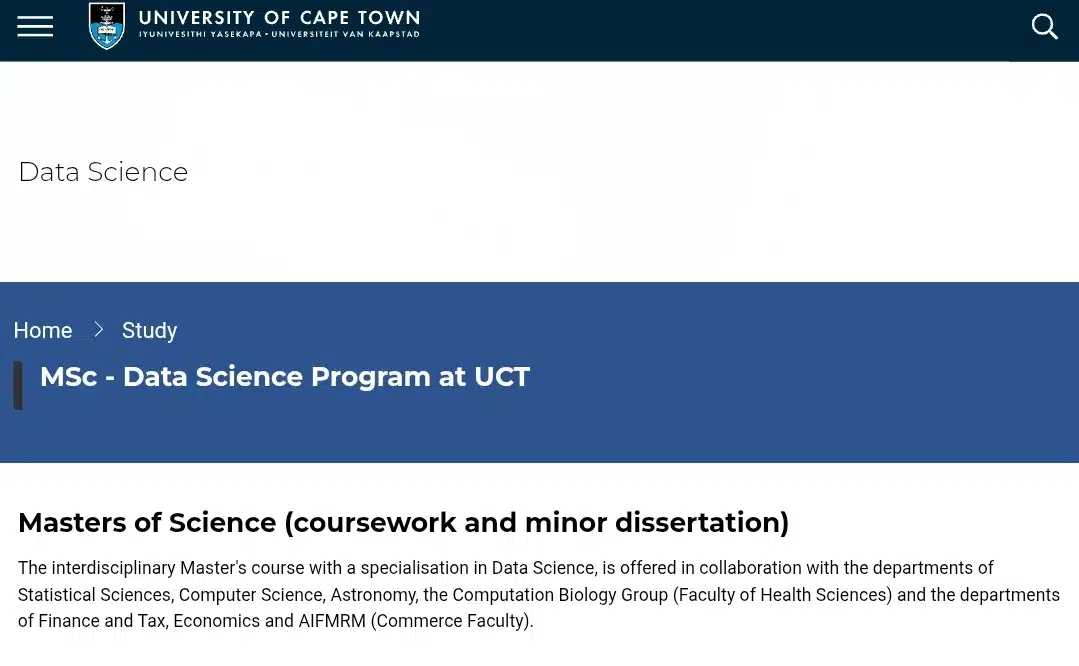
UCT’s Data Science postgraduate track allows students to tailor their studies toward machine learning, AI, and advanced analytics. The coursework is designed to be versatile, ideal for both professional upskilling and further academic study. UCT combines technical training with hands-on projects, and the program is well-regarded for producing industry-ready graduates.
Students start with a Postgraduate Diploma focused on core data science skills. From there, they can progress to a full MSc, which integrates AI-specific topics and a substantial research component.
What You’ll Learn
- Foundational modules in statistics, programming (Python/R), databases, and visual analytics
- Advanced topics including machine learning, deep learning, natural language processing, and big data frameworks
- MSc students complete a research project or thesis involving real-world datasets, often partnering with industry or research centres
Entry Requirements
To qualify, applicants need:
- A bachelor’s degree with major components in Computer Science, Maths, Statistics, or similar fields.
- A strong analytical background (quantitative methods, programming experience)
- Honours-level background preferred for MSc entry.
- High scores in undergraduate grades and possibly NBT or UCT’s own academic assessments.
Fees and Funding
- Fees depend on whether the qualification is PGDip or MSc—approximately R70,000–R90,000 for the full MSc programme.
- NSFAS support is available for qualifying South African students.
- Merit-based scholarships and departmental bursaries may cover part or all of the MSc tuition.
How to Apply
- Applications are submitted through UCT’s central admissions portal
- Required documents include certified transcripts, motivation letter, CV, and sometimes NBT results
- MSc candidates usually also present a short research proposal or personal statement
- Application deadlines vary: PGDip typically opens in October, while MSc deadlines may fall in August/September
Who It’s Best For
This pathway is well-suited to those seeking flexibility. You can start with a PGDip to build a technical foundation, then decide if you’d like to transition to a full MSc. It’s also ideal if you’re targeting roles in data science, analytics, or AI engineering, or thinking of moving into AI-focused research. This route gives you both structured training and an opportunity to specialise without committing to a full research degree initially.
8. AltSchool Africa – Learn AI (Free Introductory Course)
Free online course • 8 modules • Africa-centric use cases • Digital certificate
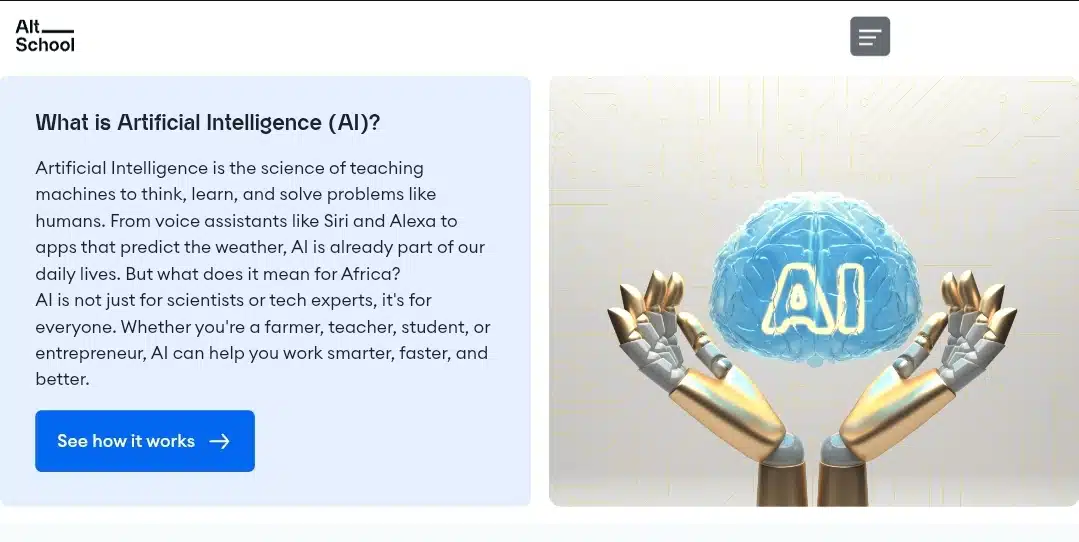
AltSchool Africa, an edtech platform aiming to train 10 million Africans offers a free, beginner-friendly AI course designed for absolute newcomers. You don’t need any prior coding or math experience. The focus is on practical understanding: what AI is, where it’s used in daily life, and how it impacts your community.
The course is fully online with short video lessons, downloadable modules, and a certificate upon completion. It also includes a capstone project where you apply what you’ve learned to a real-world scenarios.
What You’ll Learn
- Introduction to AI and how it works—in plain English (no heavy math)
- Everyday AI tools and applications
- Principles of ethical AI
- A final project that gives you something tangible to show
Designed to be accessible, this course is perfect if AI seems overwhelming and you just want to explore its possibilities.
Entry Requirements
- No academic background required
- No programming skills needed
- Must have reliable internet access and be based (or able to study) in Africa
Fees and Funding
- Completely free—no tuition, no hidden costs
- Certificate provided at no charge
How to Apply
- Visit AltSchool Africa’s “Learn AI” page
- Sign up with an email address—no fee or formal application
- Begin immediately with the self-paced modules
Check the website for periodic deadlines or intake windows.
Who It’s Best For
This course is ideal if you’re curious about AI but not ready for technical study. It helps you build confidence and clarity. Many learners view it as a stepping stone—perfect for deciding whether to commit to more in-depth programs like PGDip or MSc.
9. Digital Regenesys – 24‑Week Certificate in Artificial Intelligence (Online)
Beginner-friendly, free (as of last update) with practical focus for youth
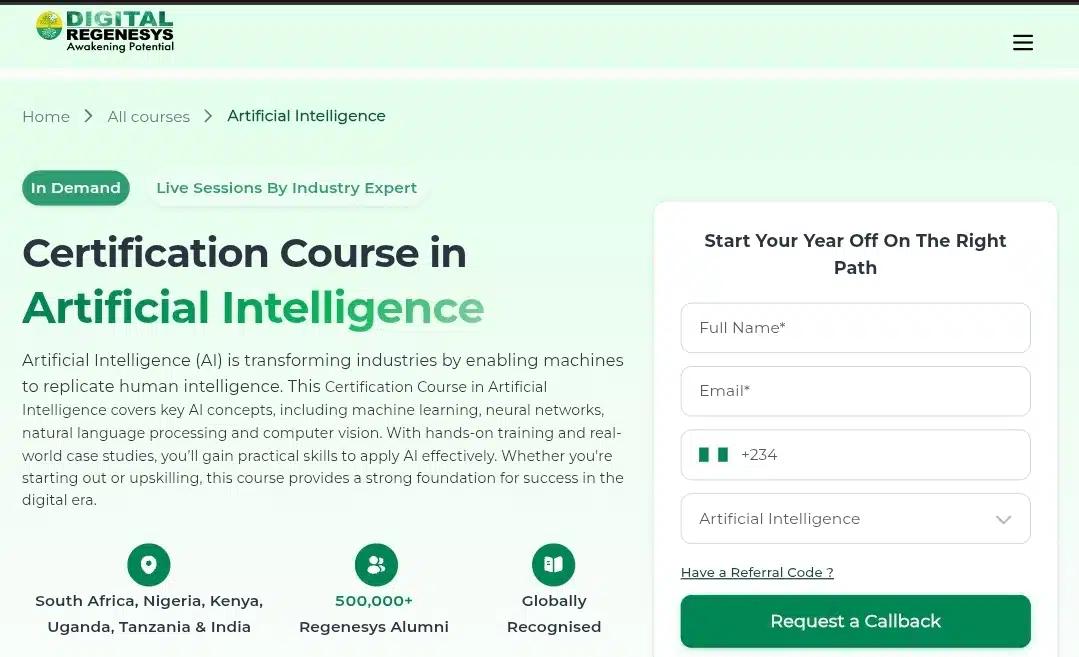
Digital Regenesys offers a flexible, fully online Artificial Intelligence certificate aimed at beginners through to advanced learners. Over 24 weeks, the program covers core AI concepts and tools. It’s designed to be practical and career-focused, with live lessons by PhD-level instructors and real-world capstone projects—making it well-suited for both individuals and corporate teams.
What You’ll Learn
- Introductory modules: Programming foundations for AI (Python-based)
- Intermediate topics: Predictive modelling, regression, classification, clustering
- Advanced subjects: Deep learning, neural architectures, NLP, and computer vision
- Students also work on live projects using mainstream AI frameworks and tools like TensorFlow, Keras, OpenCV, NLTK, Pandas, NumPy, and Scikit-Learn.
Entry Requirements
This program welcomes a diverse audience, including:
- College students, fresh graduates, and tech professionals
- Non-tech professionals and domain specialists (e.g., finance, healthcare, marketing)
- No prior coding or math background is required—everything starts from the basics.
Fees and Funding
- Tuition: Approximately R49,000, with flexible installment plans available.
- Accreditation: Recognised by the Institute of IT Professionals South Africa (IITPSA), offering CPD points.
- No financial aid is provided, but some companies may sponsor staff enrolment.
How to Apply
- Visit Digital Regenesys’s website and locate the AI course page.
- Complete the online enquiry/enrolment form—no formal application required.
- A course advisor will follow up to finalize registration, payment plans, and access details.
Who It’s Best For
If you want a structured yet flexible entry into AI, with hands-on project work and no prior experience required, this course is a solid choice. It’s ideal for working professionals, career switchers, or students who want accredited skills and a practical certificate that can open doors in tech or industry settings.
10. Optimi College – AI Apprentice to AI Architect (Skillsoft Aspire Journey)
Online, hands-on capstone projects • Fee: R49 000 • Beginner‑friendly
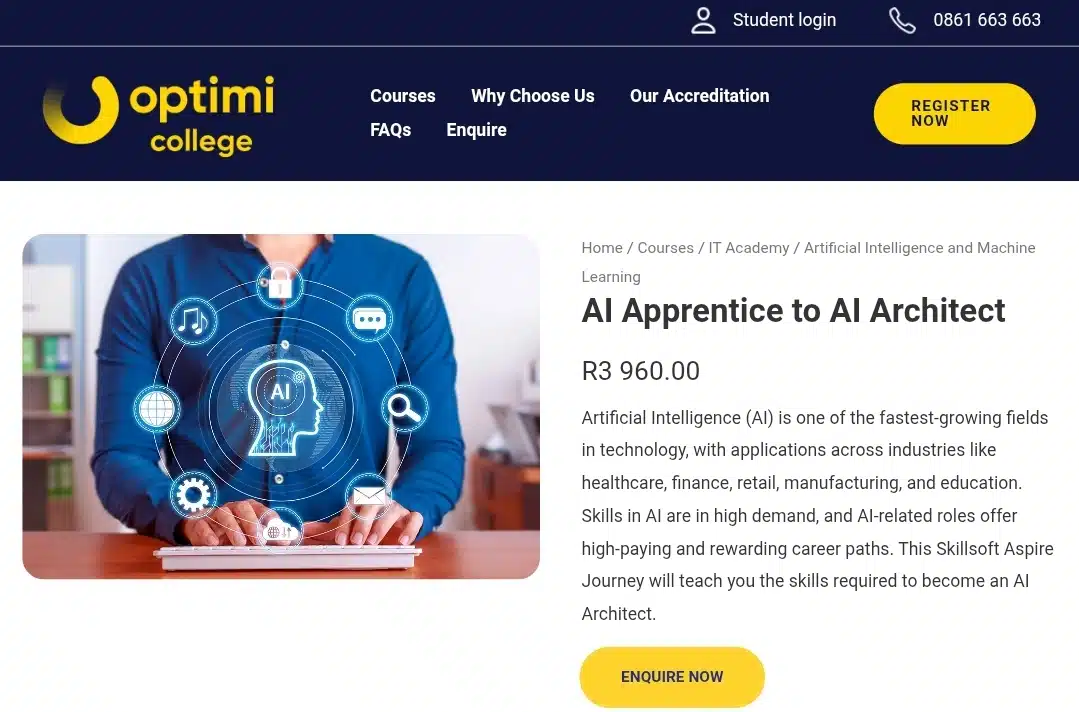
Optimi College offers a guided AI training ladder based on Skillsoft’s “AI Apprentice to AI Architect” journey. Designed as a multi-track online program, it takes learners from beginner (AI Apprentice) through to advanced (AI Architect) in a flexible, self-paced format. You’ll move through layers of theory, practical labs, mentorship access, and real-world simulations — all via Skillsoft’s industry-standard platform.
What You’ll Learn
The course is divided into four progressive stages:
- AI Apprentice – Introduces theory, Python basics, human–computer interaction, computer vision, and cognitive modeling.
- AI Developer – Covers frameworks like Keras, CNTK, Spark, and early AI deployment strategies.
- AI Practitioner – Deals with advanced tool usage, full-stack ML engineering, and optimization techniques.
- AI Architect – Focuses on AI enterprise architecture, explainable AI, dashboarding, and scalable AI systems.
Each stage includes video lessons, 24/7 mentor support, hands-on labs, and practice testing—allowing learners to advance at their own pace.
Entry Requirements
You’ll get the most out of this pathway if you have:
- Basic coding familiarity (ideally Python), though the program starts with foundational concepts
- Strong self-motivation and commitment to auto-directed learning
Fees and Funding
- As listed on CourseTakers, the full four-stage journey is approximately R12,789.
- This covers lifelong course access, labs, mentorship, and assessments.
- No scholarships or subsidies are advertised.
How to Apply
- Enrol through Optimi College’s website or affiliated platforms by filling out an online enquiry form.
- A course advisor follows up to confirm your registration, guide payment, and grant access to the Skillsoft portal.
Who It’s Best For
This pathway suits motivated learners who prefer a structured, online-first journey, from understanding AI basics to architect-level thinking without stepping onto a university campus. It’s ideally suited for self-starters, career switchers, or professionals eager to upskill flexibly and affordably.
Top 10 AI Courses in South Africa- Snapshot
| Institution | Course name | Level | Duration | Cost | Funding/scholarship | Best for |
| Stellenbosch University | MSc in Machine Learning & AI | Master’s | 1–2 yearsFull-time / Part-time | ~R40K–R50K | DeepMind Africa, Merit Bursaries | Research-focused students with strong math background |
| Wits University | MSc in Artificial Intelligence | Master’s | 2 yearsFull-time / Part-time | ~R44K/year | NRF, Wits Merit Awards | Students aiming for AI research and applied ML |
| UCT | BSc in Computer Science (AI modules) | Bachelor’s | 3 years Full-time | ~R65K/year | NSFAS, UCT Merit Scholarships | Beginners looking for a solid AI/CS foundation |
| University of Johannesburg (UJ) | Master of AI (Coursework) | Master’s | 1–2 yearsFull-time / Part-time | Varies | Bursaries, external funding | Professionals applying AI in diverse fields |
| University of Pretoria (UP) | BSc Honours / MSc with AI Modules | Honours / Master’s | 1–2 yearsFull-time | ~R50K–R60K/year | NRF, UP Internal Awards | Students seeking flexible specialisation within CS |
| AIMS – AMMI | African Master’s in Machine Intelligence | Master’s | 10–12 monthsFull-time (on-site) | Free | Fully funded (incl. accommodation & stipend) | Top students keen on AI research for societal good |
| UCT – Data Science Track | PGDip / MSc in Data Science (AI Focus) | PGDip / MSc | 1–2 yearsFull-time / Online | ~R70K–R90K | NSFAS, UCT Dept. Bursaries | Analysts and data professionals branching into AI |
| AltSchool Africa | Learn AI | Certificate | Self-paced (~4 weeks)OnlineSelf-paced (~4 weeks) | Free | None needed | Curious beginners exploring AI for the first time |
| Digital Regenesys | Certificate in AI | Certificate | 24 weeksOnline | ~R49K | Flexible payment plan | Career switchers wanting hands-on AI training |
| Optimi College (Skillsoft) | AI Apprentice to Architect | CertificatePathway | Self-paced (~6 months)Online | ~R12,789 | None | Self-driven learners looking for guided progression |
Final Thoughts
There’s no shortage of AI courses in South Africa. From fully funded master’s programs at AIMS to flexible online certificates from platforms like Optimi and AltSchool, the landscape is wide and growing fast. What matters is figuring out what fits you.
If you’re gunning for research or PhD-level work, a university-based MSc with a strong mathematical core might be your best bet. On the flip side, if you’re transitioning from another field or just getting your feet wet, an online, low-barrier course can offer the clarity and confidence you need before taking the plunge.
South Africa’s AI ecosystem is evolving, and thanks to local institutions stepping up with tailored programs, you don’t need to leave the continent to get world-class training.
Over to you:
Have you taken any of these courses, or are you considering applying? Are there great programs you think should’ve made this list? Share your thoughts in the comments—we’d love to hear what your AI journey looks like.

